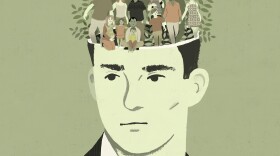
Rhaina Cohen
Rhaina Cohen is a producer and editor for NPR's Enterprise Storytelling unit, working across Embedded, Invisibilia, and Rough Translation.
Previously, she was a producer for Hidden Brain, where she brought together narrative journalism and social science research. Some of the most rewarding stories she worked on include those about why the #MeToo movement took off when it did, how American masculinity makes it harder for men to build close friendships and why we sometimes make decisions that baffle us. Cohen joined NPR as an intern for Planet Money.
She periodically writes for outlets such as The Atlantic, The Washington Post, and The New Republic. Her article about people who make a friend their life partner was selected by Longreads as one of the best articles of 2020. She received some of her earliest journalism training as a research assistant for authors. She worked on the New York Times bestselling book All The Single Ladies: Unmarried Women and the Rise of an Independent Nation and the biography Michelle Obama: A Life.
Cohen was a Marshall Scholar at Oxford, where she earned a master's in comparative social policy (and while there, competed in a dance style that hasn't yet taken off in the United States: acrobatic rock 'n' roll). She holds a bachelor's degree in American Studies from Northwestern University. As a 2018 FASPE fellow, she studied journalism ethics in Germany and Poland.
-
Olutosin Oduwole was a college student and aspiring rap star when he was charged with "attempting to make a terrorist threat." Did public perceptions of rap music play a role?
-
Violent crimes committed by Muslims are much more likely to be reported as "terrorism." And that has disturbing consequences for the way Muslims are perceived.
-
A culture of racism can infect us all. On this week's radio show, we discuss the implicit biases we carry that have been forged by the society around us.
-
No matter how much time we spend thinking about the future, we don't get any better at predicting it. We talk to Dan Gilbert about how we can use this research to lead happier lives.
-
Every time you give in to the buzzing notifications of our phone or computer, you pay a price: little by little, you lose your ability to focus.
-
According to research, between 10 and 40% of kids who intend to go to college at high school graduation don't show up in the fall. This phenomenon, known as "summer melt," has puzzled universities.
-
If you've ever shouted at Siri or rolled your eyes at your Roomba, you know that artificial intelligence isn't always that smart. But there's still a lot that robots can tell us about ourselves.
-
Being able to recognize faces is a crucial part of life. But why are some of us so good or bad at it, and how skilled at it are we on average? The answers may surprise you.
-
Pundits and prognosticators make predictions all the time: about everything from elections, to sports, to global affairs. This week, we explore why they're often wrong, and how we can all do better.
-
In the last five years, 12 percent of terrorist attacks in the U.S. were carried out by Muslims and more than 50 percent by far right extremists. So why the media focus on "Islamic terrorism"?











